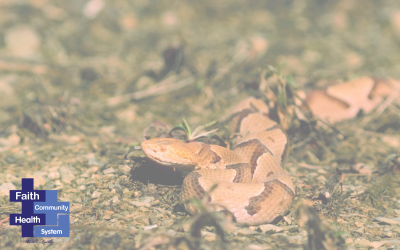Snakes are a significant concern in the summertime. The rural landscape provides a natural habitat for various snake species, including venomous ones like rattlesnakes, copperheads and cottonmouths.
If you have lived in these parts for a long time, you know all about snake bites. However, this article should serve as an important reminder and can only help you avoid these critters.
Indeed, understanding snake bite safety is crucial for residents and visitors to ensure their well-being in this environment.
Here’s some info you need to stay safe!
- Stay aware. Learning to identify local venomous snakes by their distinctive markings and behaviors can help you avoid dangerous encounters. Venomous snakes typically have triangular heads, elliptical pupils and heat-sensing pits. When hiking or working outdoors, stay on clear paths, avoid tall grass and do not reach into places you cannot see – such as rock crevices or piles of wood.
- Take precautions. Wearing protective clothing, such as boots and long pants, can reduce the risk of snake bites. Use a flashlight when walking outdoors at night to spot snakes. Additionally, keeping your yard free of debris and maintaining short grass can deter snakes from settling near your home.
- Respond immediately! If bitten by a snake, it is crucial to stay calm. Panic can increase your heart rate and spread venom more quickly. Call 911 or seek medical attention immediately, as antivenom is often necessary.
Seconds count! Get to one of Faith’s four rural clinics in Jacksboro, Bowie, Alvord or Graham (or the Faith Community Hospital or Bowie ER) as soon as possible.
- While waiting for medical help, keep the affected limb immobilized and at or below heart level to slow the spread of venom.
- Remove any tight clothing or jewelry near the bite site to accommodate swelling.
- Do not attempt to suck out the venom, make incisions, or apply ice or a tourniquet, as these actions can worsen the injury.
Faith Community Hospital partners with Peyton’s Project, named after a toddler who died from a rattlesnake bite. This partnership helps to reduce the cost of treating snake bites – which can be extremely expensive.
Do You Know About Peyton’s Project?
You can be bitten by a snake before you even see it! Responding to a snakebite quickly and appropriately is critical, especially for people in rural communities. One of the main goals of Peyton’s Project is to make sure rural hospitals are supplied with antivenom. As part of this alliance, Faith keeps vials of antivenom on site at all times.
Remember, the key is to protect yourself and your loved ones by following the advice above. By following these guidelines, you can minimize the risk of snake bites and ensure a prompt and effective response if an incident occurs. Knowledge and preparedness are key to maintaining safety in snake-prone areas.

